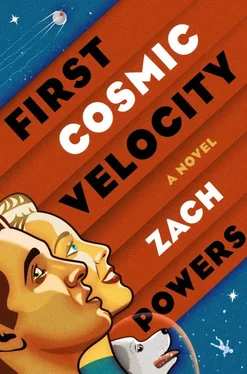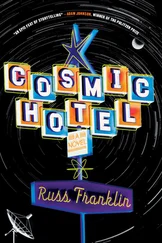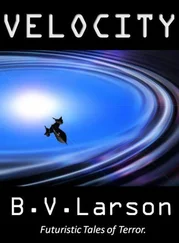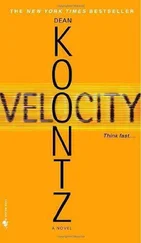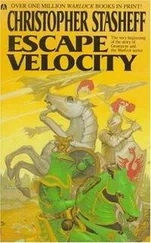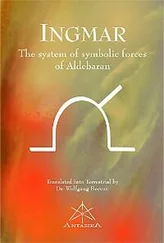The Chief Designer would have liked to weep. He felt the sorrow, yes, like cold in his bones, but part of him already looked for a solution. The mission was ready. He would allow sadness later. Always later. What he needed now was a pilot and a dog.
Leonid and Nadya had made it to the station in Kharkiv too late to catch the train he had originally intended, the one Ignatius had marked on the map. It would have carried them to Kiev, and there in the throngs of the city they could have disappeared. At least Leonid assumed that was Ignatius’s plan. At least that much of her plan was his plan, too. But while Nadya was a trained pilot and he had been taught the basics, neither turned out to be much as navigators. First, it took them more than an hour to find a store where they could purchase new clothes. They changed in the store, and left their uniforms behind. Leonid regretted abandoning his medals, not because he felt he had earned them, but because they were not his to do with as he pleased. The medals belonged to his brother.
Leonid took the map and the money and the note from the Americans, and transferred them to the pocket of his new pants. The fabric was too stiff, sharp folds that prodded him when he climbed back into the car.
If it was possible to make every wrong turn on the way to the station, they had done it. Lefts instead of rights, missed turns, street names that had no corresponding mark on the map. It was only by luck that they discovered the station. Out of nowhere, its shallow brown dome sprung into view, and just the top of the sign that identified it. The building looked more like a church than a station, except of course for the trains.
Leonid ran inside to buy tickets while Nadya found a place to park the car, but it was already an hour too late. The attendant, shuffling a stack of unused tickets as if it were a deck of cards, told him they would have to wait until tomorrow. The attendant stared hard at Leonid’s face.
“You look like…”
“I get that a lot lately,” said Leonid in Ukrainian, and hurried away.
A large map, taller than Leonid and twice as wide as that, hung on the wall opposite the ticket counter. The map had been glued directly to the plaster, paper curling out at the corners. It seemed to show every rail line in the whole country, even a few stations in southern Russia. There were many more here than on the map Ignatius had given him, marked in red like veins. Or was it arteries that carried red blood and veins blue? Giorgi would have known. A train chugged by on the other side of the wall.
He scanned the map of his home country and was saddened to recognize so few of the place names. What had he ever really known of it except the valley? Were there still people he knew there? Did they have newspapers or television? Had they seen his face? If they had, did anyone recognize him? There were no pictures of him from when he was a boy. Well, many were taken when he first came to Star City, but he declined to ever look at them. He did not know if his appearance now bore any resemblance to the boy he once was.
There, in the tiniest font imaginable, tucked in the middle of darker greens that meant mountains, he saw one name he knew. Bohdan, the hero of Ukraine. He tried to remember Grandmother’s stories. She repeated them so often he should have known them by heart. But he only remembered a few. The hero, like the town that bore his name, had faded to near nothing.
At the bottom of the map, abutting the Black Sea, where Bohdan Khmelnytsky had oared for the Ottomans, sat Odessa. Leonid knew nothing about the city except the name. He reached into his back pocket and pulled out the note from the Americans, folded into a square, fraying at the edges and ripping along the creases. He opened the paper gently using his fingertips and reread the note: Hope to see you soon! —Your Friends from America . Could he escape to America? He knew even less about America than he did about Odessa. Defecting was not the escape Ignatius had intended, but no matter how grateful Leonid might have been for her unexpected assistance, he still did not consider her a friend. To her he owed nothing. To Nadya, though…
He followed one red line on the map east from Odessa. It marked a jagged path to Kharkiv, to the very station where he stood. He had planned to go to Kiev because it seemed like the best place to start, but it turned out he could get to where he was going directly. Leonid returned to the ticket counter and bought two tickets to Odessa. The train left in less than an hour.
“You can’t get to Kiev from there,” said the attendant. “At least not easily.”
“The destination doesn’t matter much.”
But it did. For the first time he felt where he was going mattered. Nadya came in, Kasha trotting unleashed beside her. Nadya gazed up, inspecting the architecture in a disinterested way. The paint on the underside of the dome was flaking off, revealing an older version of the same color underneath.
“Tomorrow, we’ll be on the other side of the country,” Leonid told her.
“And then on to the other side of Earth. If we keep at it, I might finally complete my orbit, after all.”
Nadya took Leonid by the hand and led him to the platform. They had an easier time finding the train than they had finding the station.
The train churned upward into the hills, aiming for the higher peaks that it would never reach. Leonid started to recognize the landscape even though he had seen it before only once. Still, this type of tree—Giorgi would have known the name—was the same as in the forests he knew as a boy. One could recognize a forest without recognizing it in particular.
The sound of the train, a sound he had grown used to in his recent travels, came here in a richer timbre, echoing back upon itself so that each thump was actually a chorus of many. It reminded him of the hopeful, fearful sensation the arrival of the train made when he was a boy. The sound would crest the hill long before the train itself. Like trumpets heralding the arrival of a tsar.
The angle of the climb steepened, pressing Leonid back into the seat, a milder version of the centrifuge at Star City. The seat’s padding had been compressed to nothing, just old leather over wooden slats. He had to shift every few minutes to relieve the pressure on one side of his back or the other. He had given up trying to find a comfortable position for his buttocks. The slats underneath pinched and shifted no matter the angle. Beside him, Nadya looked out the window, never moving. He could see the reflection of her open eyes in the glass or he would have thought she was asleep. Kasha, curled on the floor in front of them, slept soundly.
There was no one else in the car with them. Maybe no one else on the whole train, if three cars and an engine could actually be called a train. The only other person they had seen was the conductor, a Kazakh or a Turkman, who did not understand Russian or did an excellent job of pretending not to. The sweaty scent of previous passengers mucked the air.
The train car leveled and then pitched forward. There had been several small descents to interrupt the generally upward progress, but this one was steeper. The view on either side was hemmed in by forest, the distant mountains disappearing like a grand illusion. The sound of the engine hushed and the brakes wailed. The car shuddered for several seconds before settling into a smooth deceleration.
Their stay in Odessa had not extended beyond the train station. On a large map like the one in Kharkiv, Leonid had again seen the name of his home village, Bohdan, this time printed larger, with the red line of a railway leading right to it. He had bought tickets before he even realized what he was doing. America would still be there in a week.
Читать дальше
